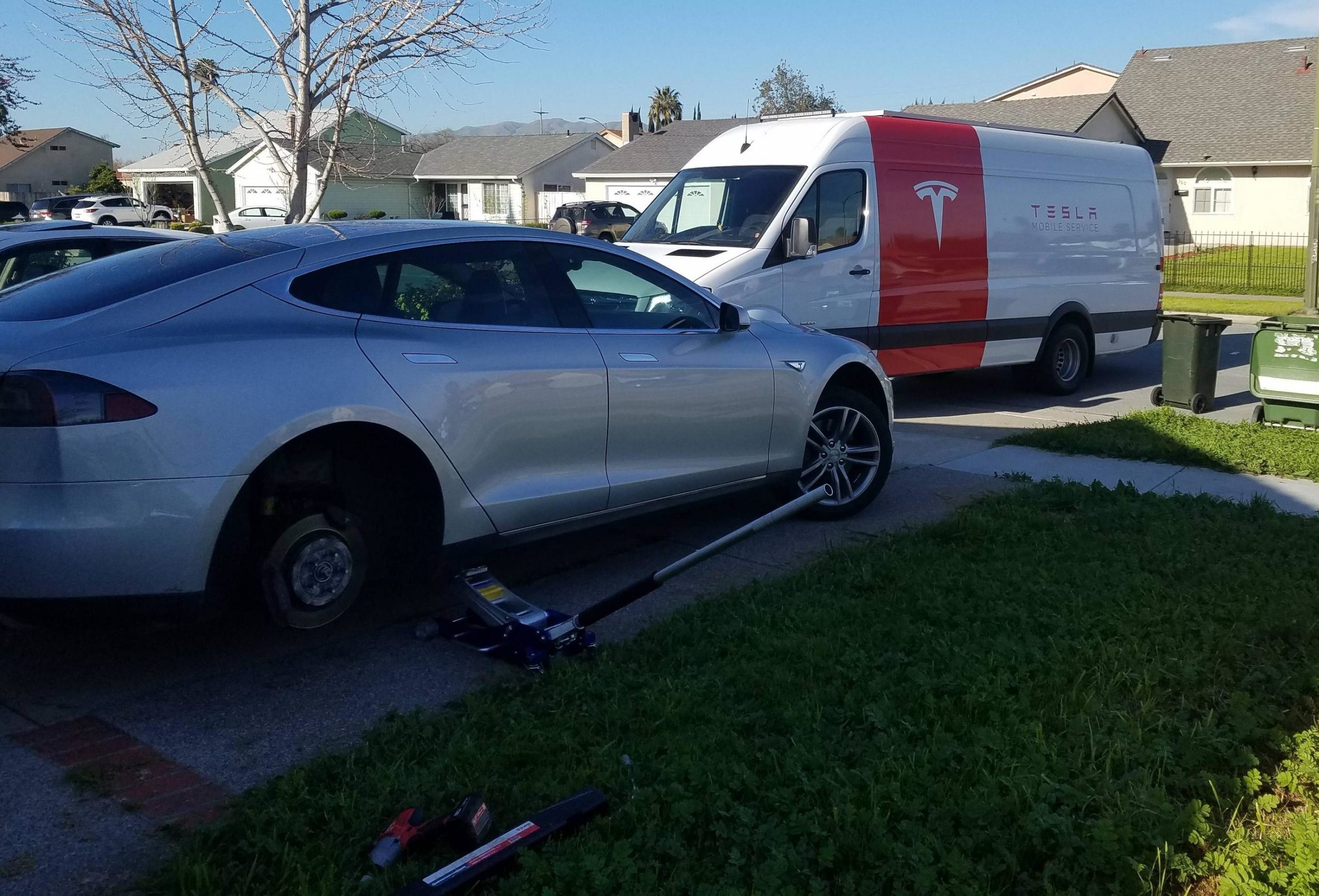
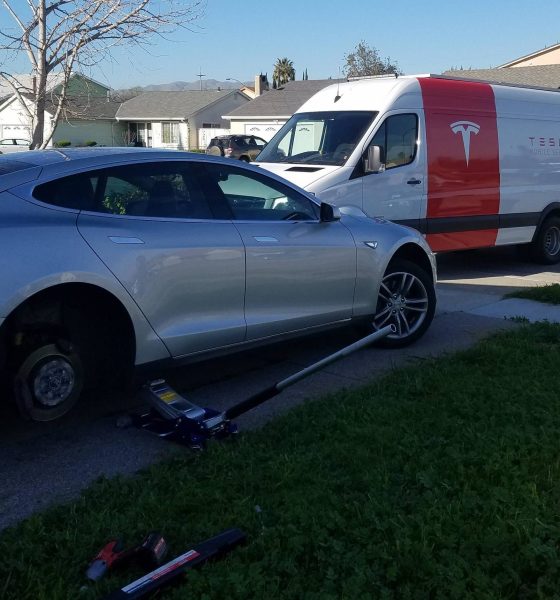
News
Tesla owners can soon request service from their mobile app, says Elon Musk
Shortly before Elon Musk revealed the long-awaited specifications and pricing for the Tesla Model 3 Dual Motor AWD version, Tesla’s CEO noted that owners would soon be able to request service through their smartphones. Musk further added that the use of the mobile-based service would require no paperwork on the part of the electric cars’ owners.
While the updated mobile repair system would cost the company more, the higher cost of the upcoming smartphone-based service will result in better “owner happiness,” making the system “worth doing.” Musk further added that Tesla owners who hear rattles or squeaks in their vehicles would be able to use their smartphones as a means for the company to pinpoint the source of the sounds. Such a process, according to Musk, would be accomplished through acoustic signature and triangulation.
We’re working on allowing you to use your phone in car when you hear a rattle/squeak & pinpoint origin by acoustic signature & triangulation
— Elon Musk (@elonmusk) May 21, 2018
As could be seen in Tesla’s support page, roadside assistance services are offered to Tesla owners as a means to “minimize inconvenience” when vehicles become inoperable. Roadside assistance is available for Tesla owners during the first four years or the 50,000 miles covered by the New Vehicle Warranty for the Model S, Model X, and Model 3. Roadside assistance is also provided under the Battery and Drive Unit Limited Warranty.
Some areas of the United States include assistance for flat tires as well. As we noted in a previous report, Tesla’s Mobile Tire Service program was launched by the electric car maker to respond to owners who end up with a flat tire. A Tesla owner who tried out the service noted that the mobile service team responded to a request within 20 minutes. The entire repair service, from flat to back-again-on-the-freeway, was completed in one hour.
Elon Musk’s tweetstorm on Saturday came as he was releasing information about the Model 3’s dual-motor AWD and Performance versions. Musk dropped several new pieces of information during his Twitter session, from the electric cars’ use of a hybrid AC induction and partial, permanent magnet electric motors and the vehicles’ white interior. Musk also provided the price and performance figures of the dual-motor AWD Performance Model 3.
Tesla has been consistent in its efforts to improve owners’ service experience. Over the past year alone, Tesla has launched several programs aimed at making repairs easier and more manageable for the company’s consumer base. During Tesla’s Q1 2017 earnings update, Elon Musk stated that the top-tier P100D variants of the Model S and Model X will be used as loaners for owners whose vehicles are in for maintenance and repairs. According to Musk, Tesla’s goal is to make a “kind of thing where (owners will) hope service takes a long time because (they) have the absolute top-of-the-line (vehicle) as a service loaner.”
Prior to the start of the Model 3’s mass production last July, Tesla also opted to add 350 more service vans to help service its ever-growing fleet. On December, Tesla launched a service that allows owners to book a service appointment online without needing to call or email the company.

News
Tesla FSD (Supervised) fleet passes 8.4 billion cumulative miles
The figure appears on Tesla’s official safety page, which tracks performance data for FSD (Supervised) and other safety technologies.

Tesla’s Full Self-Driving (Supervised) system has now surpassed 8.4 billion cumulative miles.
The figure appears on Tesla’s official safety page, which tracks performance data for FSD (Supervised) and other safety technologies.
Tesla has long emphasized that large-scale real-world data is central to improving its neural network-based approach to autonomy. Each mile driven with FSD (Supervised) engaged contributes additional edge cases and scenario training for the system.
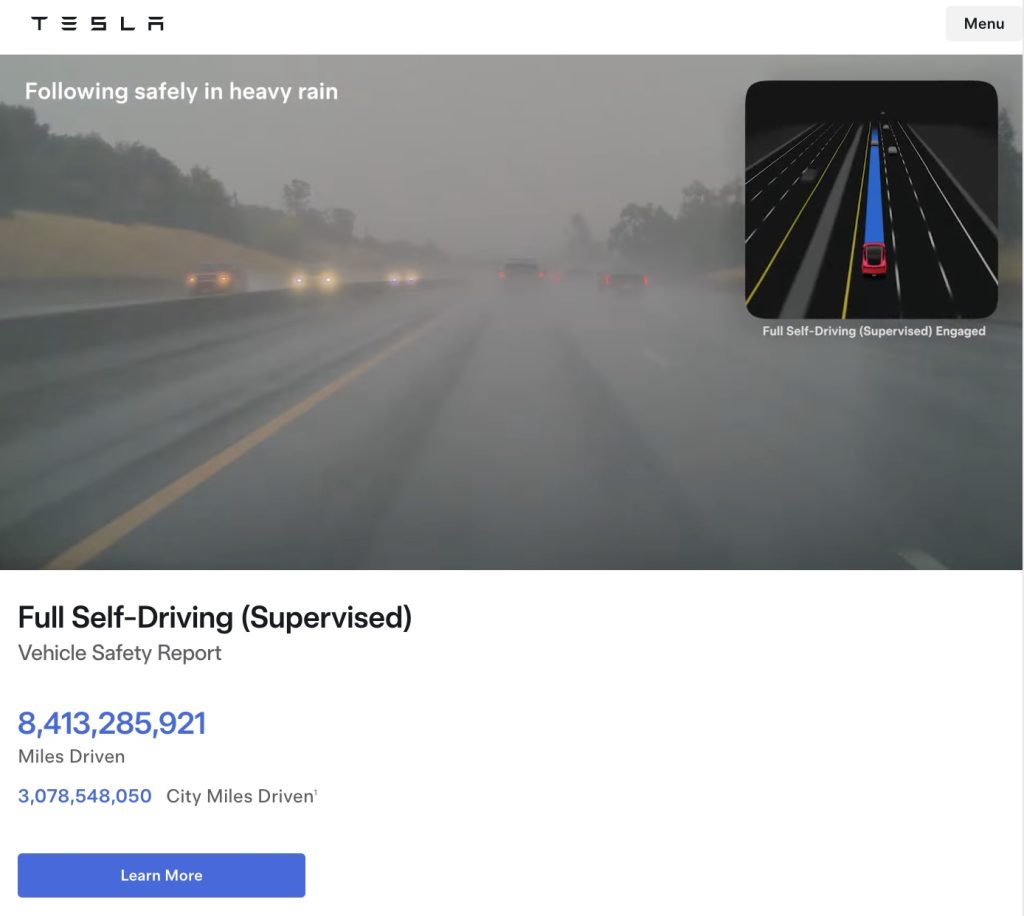
The milestone also brings Tesla closer to a benchmark previously outlined by CEO Elon Musk. Musk has stated that roughly 10 billion miles of training data may be needed to achieve safe unsupervised self-driving at scale, citing the “long tail” of rare but complex driving situations that must be learned through experience.
The growth curve of FSD Supervised’s cumulative miles over the past five years has been notable.
As noted in data shared by Tesla watcher Sawyer Merritt, annual FSD (Supervised) miles have increased from roughly 6 million in 2021 to 80 million in 2022, 670 million in 2023, 2.25 billion in 2024, and 4.25 billion in 2025. In just the first 50 days of 2026, Tesla owners logged another 1 billion miles.
At the current pace, the fleet is trending towards hitting about 10 billion FSD Supervised miles this year. The increase has been driven by Tesla’s growing vehicle fleet, periodic free trials, and expanding Robotaxi operations, among others.
With the fleet now past 8.4 billion cumulative miles, Tesla’s supervised system is approaching that threshold, even as regulatory approval for fully unsupervised deployment remains subject to further validation and oversight.
Elon Musk
Elon Musk fires back after Wikipedia co-founder claims neutrality and dubs Grokipedia “ridiculous”
Musk’s response to Wales’ comments, which were posted on social media platform X, was short and direct: “Famous last words.”
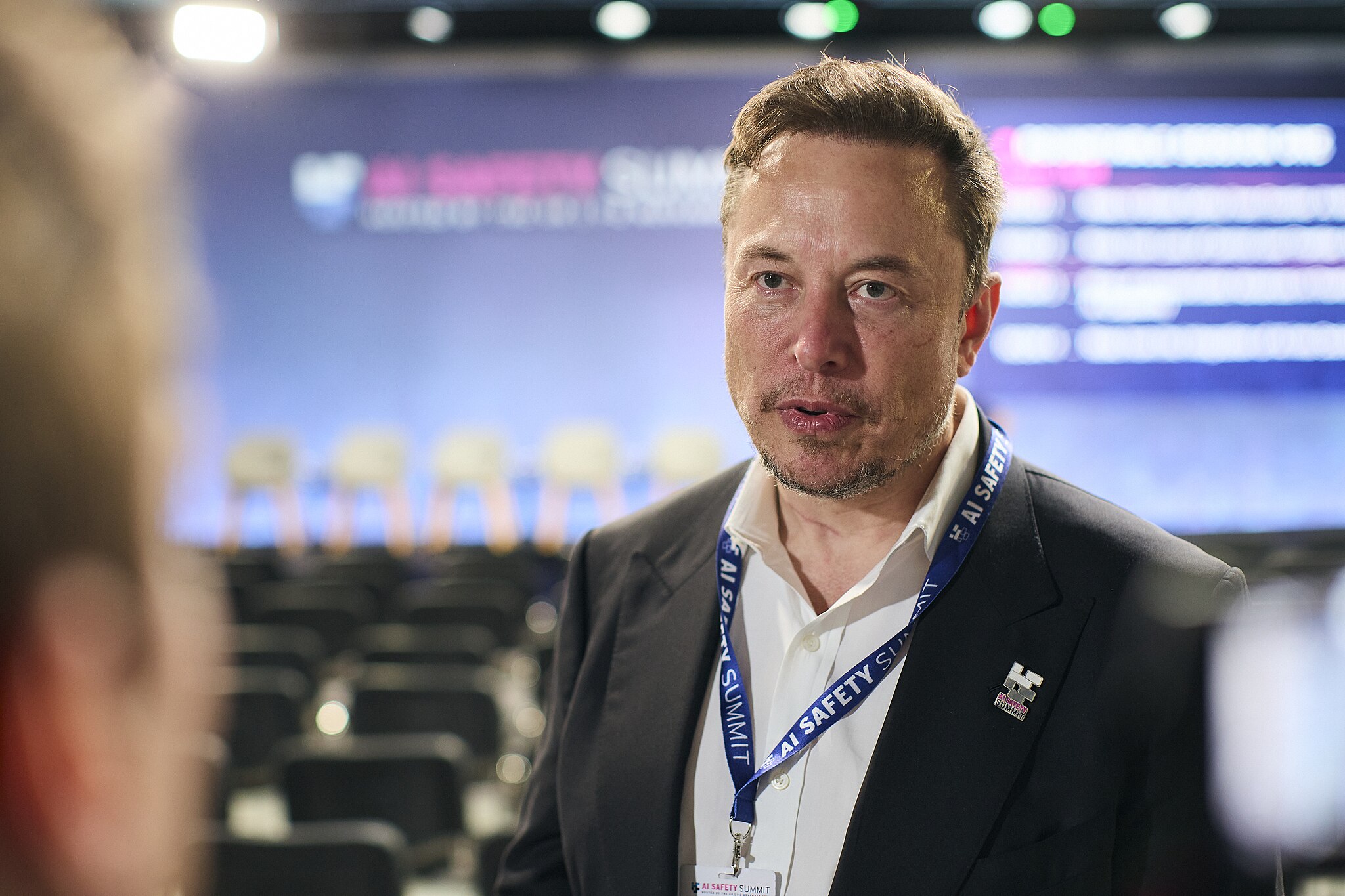
Elon Musk fired back at Wikipedia co-founder Jimmy Wales after the longtime online encyclopedia leader dismissed xAI’s new AI-powered alternative, Grokipedia, as a “ridiculous” idea that is bound to fail.
Musk’s response to Wales’ comments, which were posted on social media platform X, was short and direct: “Famous last words.”
Wales made the comments while answering questions about Wikipedia’s neutrality. According to Wales, Wikipedia prides itself on neutrality.
“One of our core values at Wikipedia is neutrality. A neutral point of view is non-negotiable. It’s in the community, unquestioned… The idea that we’ve become somehow ‘Wokepidea’ is just not true,” Wales said.
When asked about potential competition from Grokipedia, Wales downplayed the situation. “There is no competition. I don’t know if anyone uses Grokipedia. I think it is a ridiculous idea that will never work,” Wales wrote.
After Grokipedia went live, Larry Sanger, also a co-founder of Wikipedia, wrote on X that his initial impression of the AI-powered Wikipedia alternative was “very OK.”
“My initial impression, looking at my own article and poking around here and there, is that Grokipedia is very OK. The jury’s still out as to whether it’s actually better than Wikipedia. But at this point I would have to say ‘maybe!’” Sanger stated.
Musk responded to Sanger’s assessment by saying it was “accurate.” In a separate post, he added that even in its V0.1 form, Grokipedia was already better than Wikipedia.
During a past appearance on the Tucker Carlson Show, Sanger argued that Wikipedia has drifted from its original vision, citing concerns about how its “Reliable sources/Perennial sources” framework categorizes publications by perceived credibility. As per Sanger, Wikipedia’s “Reliable sources/Perennial sources” list leans heavily left, with conservative publications getting effectively blacklisted in favor of their more liberal counterparts.
As of writing, Grokipedia has reportedly surpassed 80% of English Wikipedia’s article count.
News
Tesla Sweden appeals after grid company refuses to restore existing Supercharger due to union strike
The charging site was previously functioning before it was temporarily disconnected in April last year for electrical safety reasons.
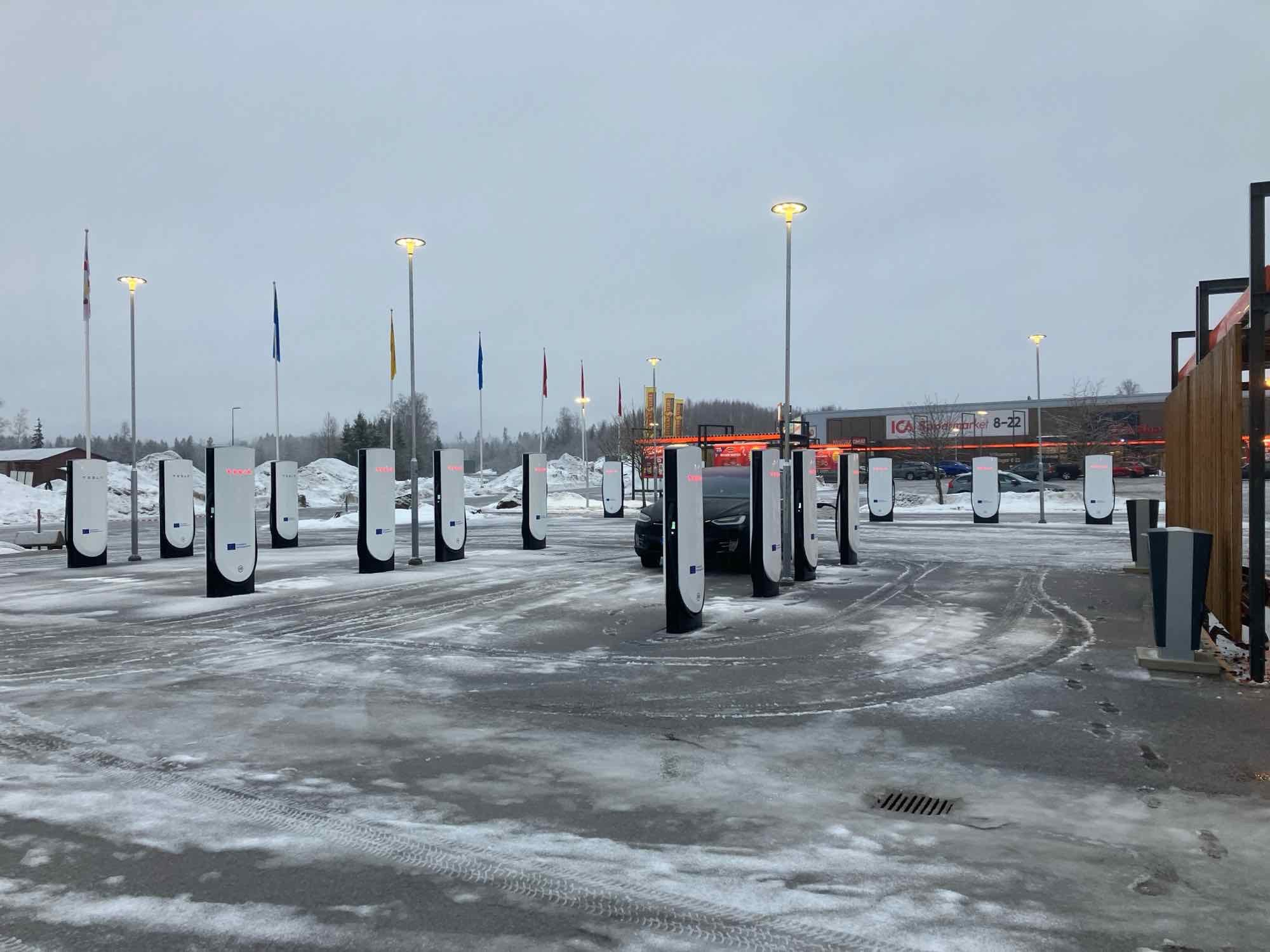
Tesla Sweden is seeking regulatory intervention after a Swedish power grid company refused to reconnect an already operational Supercharger station in Åre due to ongoing union sympathy actions.
The charging site was previously functioning before it was temporarily disconnected in April last year for electrical safety reasons. A temporary construction power cabinet supplying the station had fallen over, described by Tesla as occurring “under unclear circumstances.” The power was then cut at the request of Tesla’s installation contractor to allow safe repair work.
While the safety issue was resolved, the station has not been brought back online. Stefan Sedin, CEO of Jämtkraft elnät, told Dagens Arbete (DA) that power will not be restored to the existing Supercharger station as long as the electric vehicle maker’s union issues are ongoing.
“One of our installers noticed that the construction power had been backed up and was on the ground. We asked Tesla to fix the system, and their installation company in turn asked us to cut the power so that they could do the work safely.
“When everything was restored, the question arose: ‘Wait a minute, can we reconnect the station to the electricity grid? Or what does the notice actually say?’ We consulted with our employer organization, who were clear that as long as sympathy measures are in place, we cannot reconnect this facility,” Sedin said.
The union’s sympathy actions, which began in March 2024, apply to work involving “planning, preparation, new connections, grid expansion, service, maintenance and repairs” of Tesla’s charging infrastructure in Sweden.
Tesla Sweden has argued that reconnecting an existing facility is not equivalent to establishing a new grid connection. In a filing to the Swedish Energy Market Inspectorate, the company stated that reconnecting the installation “is therefore not covered by the sympathy measures and cannot therefore constitute a reason for not reconnecting the facility to the electricity grid.”
Sedin, for his part, noted that Tesla’s issue with the Supercharger is quite unique. And while Jämtkraft elnät itself has no issue with Tesla, its actions are based on the unions’ sympathy measures against the electric vehicle maker.
“This is absolutely the first time that I have been involved in matters relating to union conflicts or sympathy measures. That is why we have relied entirely on the assessment of our employer organization. This is not something that we have made any decisions about ourselves at all.
“It is not that Jämtkraft elnät has a conflict with Tesla, but our actions are based on these sympathy measures. Should it turn out that we have made an incorrect assessment, we will correct ourselves. It is no more difficult than that for us,” the executive said.








